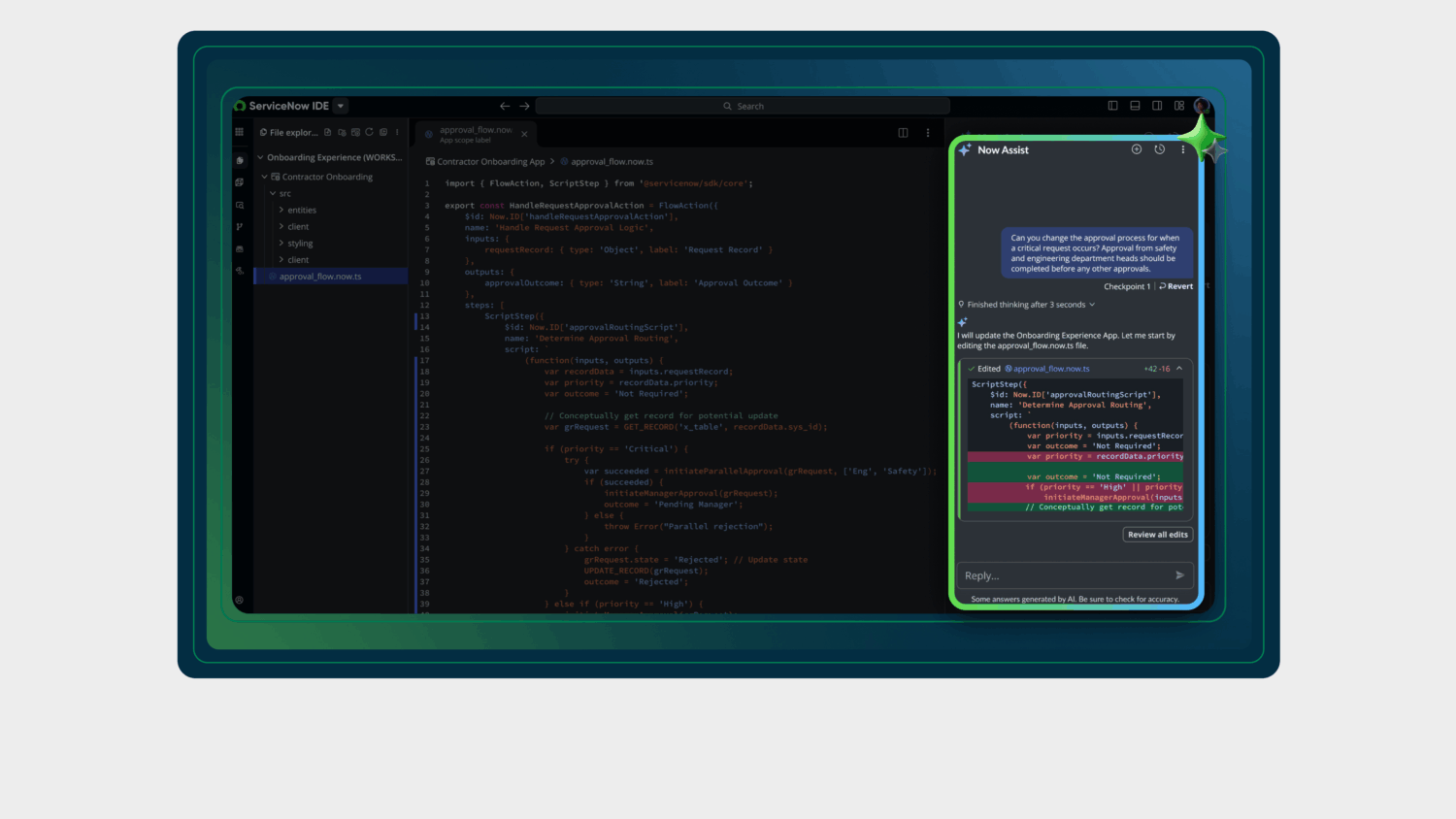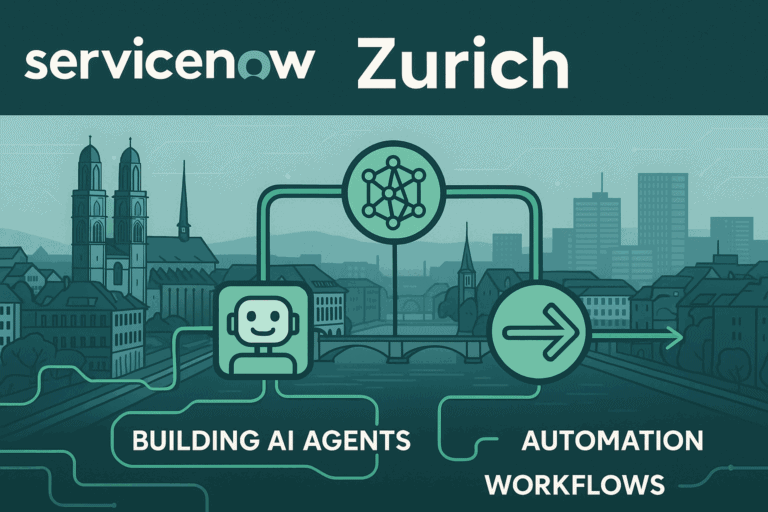ServiceNow has announced its Zurich platform release. Introducing what the company describes as “powerful agentic AI that unifies automation, development and security” on a single platform. In this release ServiceNow introduces Vibe coding to build agents, sandboxes and better security controls for data and agents.
The Zurich release follows ServiceNow’s previous Yokohama platform launch and represents the company’s continued expansion into AI-driven enterprise automation.
According to ServiceNow, Zurich introduces capabilities designed to help organizations move from traditional workflow automation to AI-enhanced processes.They also emphasize on democratizing application development and implementing security frameworks for AI agent deployment.
Build Agents with natural language
The centerpiece of Zurich’s development capabilities is the “Build Agent”, which allows users to create applications through natural language prompts rather than traditional coding approaches. The system is designed to work with what they call “vibe coding”. Vibe coding helps users to build applications or agents with natural language, regardless of their technical skill level. Any employee can build an application in minutes.

Techzine joined a briefing where ServiceNow showed how the Build Agent handles the complete development lifecycle: analyzing requirements from natural language descriptions, generating code, running diagnostic processes, identifying and fixing errors, and deploying applications through existing CI/CD pipelines. The system completed a warehouse inventory management dashboard in minutes, including debugging and deployment phases.
The Build Agent integrates with ServiceNow’s new sandbox environments, providing isolated development spaces where multiple developers can work on applications without conflicts. This addresses collaboration challenges that typically occur when teams work on shared codebases.
ServiceNow’s approach builds on its existing low-code capabilities. As Techzine previously reported, the company has been making the Now platform increasingly AI-driven, intending to automate tasks that previously required manual intervention.
Process and Task Mining Integration
Zurich introduces task mining as part of its existing process mining capabilities. While process mining tracks how work flows through automated systems, task mining captures the human actions. Task mining analyzes every click and process step a user takes within enterprise applications.
The combination provides what ServiceNow describes as comprehensive visibility into organizational inefficiencies. The platform analyzes both human and automated workflows, then automatically suggests opportunities for optimization. During the demonstration, the system identified bottlenecks in warehouse processes and recommended specific areas for AI-driven improvements.
These mining capabilities feed into ServiceNow’s broader AI strategy by identifying processes suitable for automation through AI agents. It gives organisations insights into the processes it should improve with AI on a silver platter. Task mining is now part of the ServiceNow process mining solution.
Agentic playbooks and workflow enhancement
Building on ServiceNow’s existing workflow automation infrastructure, Agentic Playbooks allow organizations to enhance established processes with AI capabilities without rebuilding existing automation investments. The system maintains human oversight while incorporating AI agents into specific workflow steps.
The demonstration showcased a sales contract renewal process in which AI agents handled tasks such as analyzing customer data, calculating discount recommendations, and preparing contract proposals. The human user maintained decision-making authority while AI handled data analysis and routine processing steps.
The system incorporates contextual awareness, enabling AI agents to understand which workflow step is active and what data is relevant without requiring detailed prompting. When users make process modifications during execution, the platform can recommend incorporating these changes into the base workflow, creating continuous improvement cycles.
ServiceNow claims to leverage its 20 years of workflow automation experience and data to train AI systems on established business processes, rather than requiring organizations to start from scratch with AI implementation.
Security framework for AI Agents
Zurich introduces two primary security components designed explicitly for managing AI agents. The Machine Identity Console treats AI agents as a distinct identity type, separate from human users and traditional machine accounts.
The console provides real-time monitoring of API integrations, identifies high-risk connections, and offers guided remediation for security issues. During the demonstration, it flagged dormant accounts and integrations using basic authentication, recommending migration to OAuth with granular permissions.
The ServiceNow Vault Console handles data classification and protection for AI environments. The system can identify sensitive data, such as PII information. It can apply protection methods including data anonymization for development environments, field encryption for insider threat protection, and dynamic access controls based on user risk profiles, which ServiceNow calls zero trust.
For organizations with data sovereignty requirements, particularly in Europe, Zurich offers EU data center options, region-specific support staffing, and customer-controlled encryption keys.
AI Control Tower and governance
The platform includes what ServiceNow calls an AI Control Tower for enterprise-wide AI governance. As Techzine noted, this addresses the growing complexity of managing multiple AI agents and maintaining oversight of autonomous processes.
The Control Tower tracks AI agent deployment, monitors effectiveness, and manages workflows across the platform. It provides compliance checking, ensures approved LLM usage, and analyzes prompts for sensitive information. However, as Techzine reported, integration with third-party AI systems remains limited because external platforms don’t yet provide comprehensive logging data.
ServiceNow emphasizes that all governance and security controls are embedded natively in the platform rather than added as separate tools, ensuring that applications built with the Build Agent or enhanced with AI capabilities automatically flow through established security pipelines.
Zurich is not the end of the ServiceNow AI journey
ServiceNow Zurich represents a significant expansion of the company’s AI capabilities, particularly in democratizing application and agent development, as well as providing security frameworks for AI agent deployment. All Zurich features are generally available to ServiceNow customers in this latest platform release.
Organizations can now update to Zurich and start adapting their processes with all these new features. In the next few months, we hope to learn how fast customers can integrate all these features in their development and governance processes. Let’s see how fast customers will build or convert to AI-enhanced workflows and agents. However, ServiceNow is far from finished; more AI announcements are expected soon. Just like many other platforms, ServiceNow is innovating at a fast pace to become one of the most dominant AI platforms.
